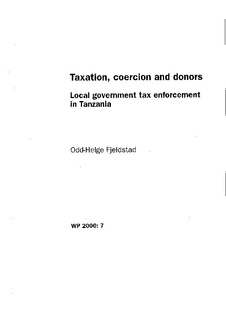| dc.contributor.author | Fjeldstad, Odd-Helge | |
| dc.date.accessioned | 2008-02-27T12:32:56Z | |
| dc.date.accessioned | 2017-03-29T09:13:11Z | |
| dc.date.available | 2008-02-27T12:32:56Z | |
| dc.date.available | 2017-03-29T09:13:11Z | |
| dc.date.issued | 2000 | |
| dc.identifier.isbn | 82-90584-60-1 | |
| dc.identifier.issn | 0804-3639 | |
| dc.identifier.uri | http://hdl.handle.net/11250/2436055 | |
| dc.description.abstract | This paper presents three propositions about tax collection in local authorities in Tanzania. First, revenue performance depends on the degree of coercion involved in tax enforcement. Second, the extent of coercion depends on the bargaining powers of the stakeholders involved in the tax enforcement process. In particular, the "balance of power" between elected councillors and the local government administration is important. Third, the presence of donors in a local authority may be crucial by changing the "balance of power" with implications for accountability and democratic development. These results may explain why we observe widespread differences in revenue performance between local authorities. | |
| dc.language.iso | eng | |
| dc.publisher | Chr. Michelsen Institute | |
| dc.relation.ispartofseries | CMI Working paper | |
| dc.relation.ispartofseries | WP 2000: 7 | |
| dc.subject | Taxation | |
| dc.subject | Governance | |
| dc.subject | Development aid | |
| dc.subject | Tanzania | |
| dc.title | Taxation, coercion and donors. Local government tax enforcement in Tanzania | |
| dc.type | Working paper | |
